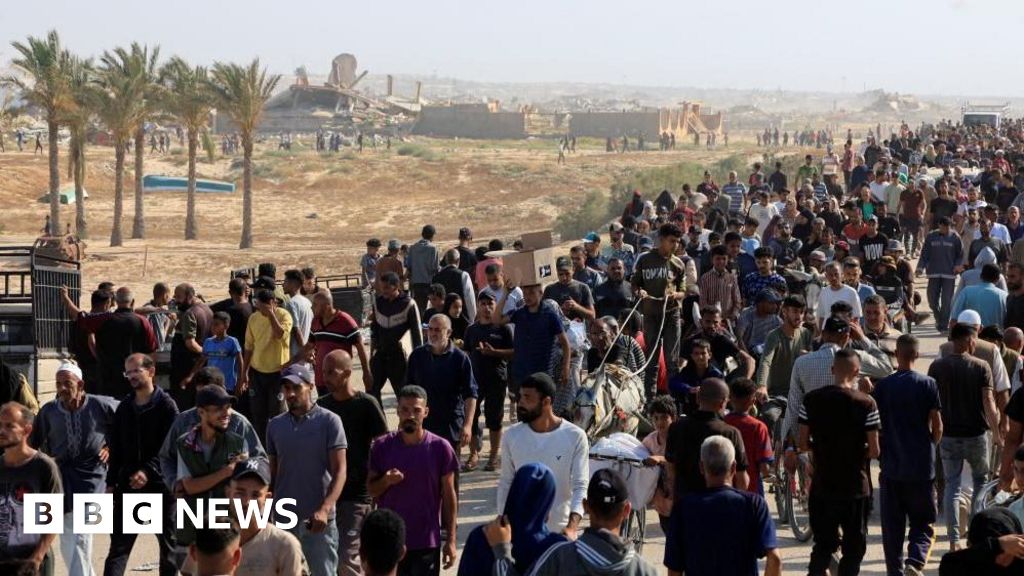Tragedy at Gaza Aid Site: 24 Dead Amid Accusations Against Israeli Forces

"Tragedy at Gaza Aid Site: 24 Dead Amid Accusations Against Israeli Forces"
In a harrowing scene that has further inflamed tensions in the already volatile region, a Gaza hospital reported the deaths of 24 Palestinians near an aid distribution site, casting a shadow over humanitarian efforts and drawing sharp accusations against the Israeli Defense Forces (IDF). The incident occurred in the early hours of May, as desperate residents gathered in hopes of securing food and essential supplies. Witnesses at the scene have pointed fingers at the IDF, alleging that the military's actions were responsible for the tragic loss of life.
The atmosphere was tense and fraught with anxiety as people, driven by necessity, converged on the aid site. The air was thick with the cries of those in need, their voices a testament to the dire situation on the ground. The hospital's report, stark in its simplicity, stated that 24 individuals had perished, their lives cut short in a place meant to offer relief and sustenance.
In a separate statement, an Israeli military official acknowledged that warning shots were fired, a measure purportedly taken to disperse the crowd. This admission, however, has done little to quell the outrage and sorrow that have gripped the community. The official's words, while intended to clarify the military's actions, have only added to the complexity of the narrative, leaving many to question the necessity and proportionality of such measures.
The scene at the aid site was one of chaos and confusion, with the sounds of gunfire mingling with the anguished cries of those caught in the crossfire. Eyewitnesses recount a scene of pandemonium, where the hopes of many were dashed in an instant. The tragic events have sparked a flurry of reactions from various stakeholders, each offering a different perspective on the unfolding crisis.
Palestinian officials have been quick to condemn the incident, calling it a blatant violation of human rights and a tragic reminder of the ongoing conflict's toll on civilian lives. Their statements are underscored by a deep-seated frustration, a reflection of the broader geopolitical tensions that continue to shape the region's landscape.
Meanwhile, international observers and humanitarian organizations have expressed grave concern over the incident, urging restraint and a renewed commitment to protecting civilians in conflict zones. Their calls for accountability and transparency echo across global platforms, highlighting the need for a comprehensive approach to address the root causes of such tragedies.
As the dust settles and the community mourns its losses, the incident at the Gaza aid site serves as a poignant reminder of the human cost of conflict. It underscores the urgent need for dialogue and diplomacy, for solutions that prioritize peace and the protection of innocent lives. In the wake of this tragedy, the world watches closely, hoping for a resolution that honors the memory of those lost and paves the way for a more hopeful future.
🔮 Fortellr Predicts
Confidence: 88%
The incident at the Gaza aid site, which resulted in the deaths of 24 Palestinians amid accusations against Israeli forces, is likely to exacerbate the already tense situation in the region. In the immediate aftermath, we can expect a surge in international attention and outcry, which could result in heightened diplomatic pressure on Israel from various global actors, including the United Nations and human rights organizations. The inflammatory nature of the event, compounded by ongoing violence and humanitarian strife, will likely fuel further protest activity across Palestinian territories. These protests are expected to trigger stronger law enforcement measures, potentially leading to additional clashes and heightened violence. Humanitarian agencies might redouble their efforts to secure safe corridors for aid distribution, though immediate success is impeded by ongoing security risks. Politically, Palestinian leadership may leverage the incident to galvanize international support, pushing for more comprehensive investigations and sanctions against Israel. Conversely, Israel might increase its narrative around security threats and justify its actions as necessary measures for maintaining border security, intensifying diplomatic standoffs. Economically, the situation will further strain an already collapsing Gazan economy. With blockades tightening, the scarcity of essential goods will worsen, driving inflation and deepening poverty. Non-governmental stakeholders, including humanitarian groups, will likely scale up emergency relief efforts but face challenges due to restricted access and safety concerns. Overall, systemic pressures will escalate, complicating peace negotiations and reinforcing cycles of violence.